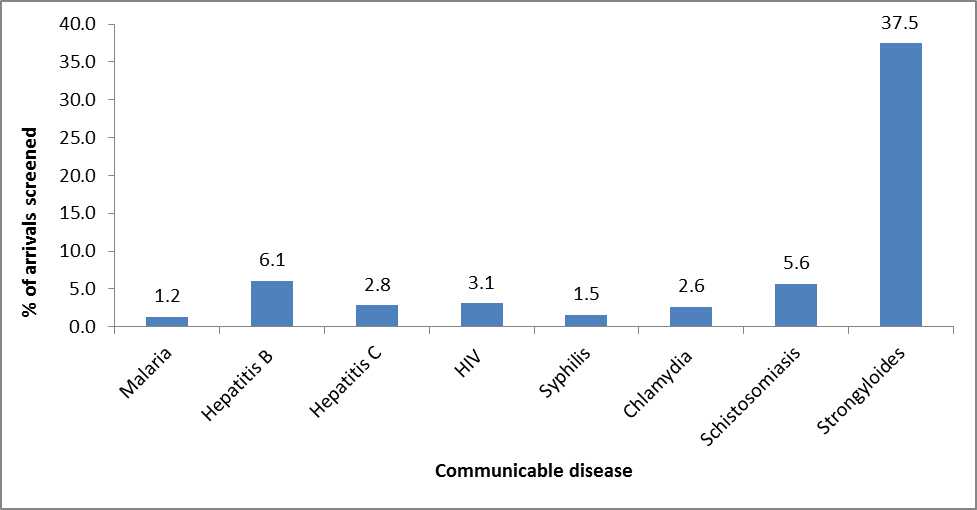Communicable Disease: Sexually Transmitted Disease
Congolese Refugee Health Profile
Figure 12: Communicable diseases found in Congolese refugees during domestic medical examinations in 6 states from 2010–2013 (n=2,355)*

Source: Refugee health screening data from health departments in California, Colorado, Illinois, New York, Texas, and Indiana
HIV
As of January 2010, HIV testing is no longer an overseas medical examination requirement. However, some state health departments provide HIV testing for refugees. Among 2,355 Congolese refugees screened in California, Colorado, and Illinois from 2010–2013, 3.1% tested positive for HIV infection (Figure 12). Data from a pilot health assessment conducted in refugee camps in Rwanda in 2012 showed that 6% of 416 refugees screened were infected with HIV (unpublished CDC data). The higher prevalence of HIV in the Rwanda pilot likely reflects a prioritization of USRAP referrals for those who are most vulnerable and have specific health needs in the first phases of the larger resettlement effort occurring over the next 5 years (i.e., approximately 50,000 Congolese to be resettled during 2013–2018). Due to this referral priority, it is likely that the first groups of Congolese refugees arriving in the US during this time period will have higher rates of HIV and should be linked to HIV services immediately following their arrival. For more information on HIV testing for Congolese refugees, refer to the Health Conditions to Consider in Post-Arrival Medical Screening of Congolese Refugees: HIV Infection section of this profile.
Syphilis
Syphilis screening is an overseas medical examination requirement, and treatment is provided overseas to those who test positive. Among 2,355 Congolese refugees screened in California, Colorado, and Illinois from 2010–2013, 1.5% were positive for syphilis infection (Figure 12). For more information on syphilis screening for Congolese refugees, refer to the Health Conditions to Consider in Post-Arrival Medical Screening of Congolese Refugees:Syphilis section of this profile.
Chlamydia and Gonorrhea
Chlamydia and gonorrhea were not found to be common infections among Congolese refugees resettled into the United States. Among 2,355 Congolese refugees screened in California, Colorado, and Illinois from 2010–2013, 2.6% tested positive for chlamydia and 0% were positive for gonorrhea (Figure 12). For more information on chlamydia and gonorrhea screening for Congolese refugees, refer to the Health Conditions to Consider in Post-Arrival Medical Screening of Congolese Refugees: Chlamydia and Gonorrhea section of this profile.
- Page last reviewed: August 29, 2014
- Page last updated: August 29, 2014
- Content source:


 ShareCompartir
ShareCompartir